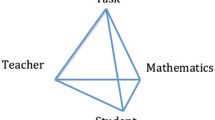Abstract
The article is based on an extensive microethnographic study (Planas, 2001) that was focused on students aged 15–16 years who exhibited a high number of interruptions in their participation in the mathematics classroom. Our research points to the importance of considering how the students construe normative meanings for the classroom episodes, and how they value others and the knowledge construed. We argue that some interruptions in the students’ participation can be understood as an active contestation to the classroom norms and to the perceived valorisations. Broadening the understanding of the learning opportunities for all the students requires studying further how the classroom sociocultural context and participants’ valorisations mediate both the participation processes and the construction of mathematical knowledge.
Similar content being viewed by others
References
Abreu, G. de (2002). Towards a cultural psychology perspective on transitions between contexts of mathematical practices. In G. de Abreu, A. J. Bishop, & N. C. Presmeg (Eds.),Transitions between contexts of mathematical practices (pp. 173–192). Dordrecht, The Netherlands: Kluwer
Boaler, J. (1993). The role of contexts in the mathematics classroom: Do they make mathematics more “real”?For the Learning of Mathematics, 13(2), 12–17.
Carpay, J., & Van Oers, B. (1999). Didactic models and the problem of intertextuality and poliphony. In Y. Engeström, R. Miettinen, & R. Punamäki (Eds.),Perspectives on activity theory (298–313). Cambridge: Cambridge University Press.
Civil, M. (1990). “You only do math in math”: a look at four prospective teachers’ views about mathematics.For the Learning of Mathematics, 10(1), 7–9.
Civil, M., Planas, N., & Fonseca, J. D. (2000). La atención a la diversidad en la clase de matemáticas: hacia una participación pedagógica y matemática.UNO, 23, 29–42.
Civil, M., & Planas, N. (2002).Participation in the mathematics classroom: Does every student have a voice? Manuscript submitted for publication.
Davies, G. (1994).Poststructuralist theory and classroom practice. Geelong, VIC: Deakin University Press.
Engeström, Y. (1999). Activity theory and individual and social transformation. In Y. Engeström, R. Miettinen, & R. Punamäki (Eds.),Perspectives on activity theory (pp. 325–344). Cambridge: Cambridge University Press.
Gorgorió, N., & Planas, N. (2000). Researching multicultural classes: A collaborative approach. In J. P. Matos & M. Santos (Eds.),Proceedings of the 2nd International Mathematics Education and Society conference (pp. 265–274). Montechoro, Portugal.
Lave, J. (1988).Cognition in practice. Cambridge, USA: Cambridge University Press.
Lerman, S. (2000). The social turn in the mathematics education research. In J. Boaler (Ed.),Multiple perspectives on mathematics teaching and learning (pp. 19–44). Westport, CT: Ablex.
Morgan, C. (1998). Assessment of mathematical behaviour: A social perspective. In P. Gates (webmaster),First Mathematics Education and Society Conference Proceedings, Retrieved from http://www.nottingham.ac.uk/csem/meas/papers/morgan.html.
Morgan, C. (2000). Discourses of assessment-discourses of mathematics. In J. P. Matos & M. Santos (Eds.),Proceedings of the 2nd International Mathematics Education and Society conference (pp. 58–76). Montechoro, Portugal.
Morgan, C., Evans, J., & Tsatsaroni, A. (2002). Emotion in school mathematics practices: A contribution from discursive perspectives. In P. Valero & O. Skovsmose (Eds.),Proceedings of the 3rd International Mathematics Education and Society conference (pp. 400–413). Copenhaguen, Denmark: Centre for Research in Learning Mathematics.
Planas, N. (1999).Ambient de resolució de problemes en una classe multiètnica:Identificació de norma social, norma sociomatemàtica i norma matemàtica. Unpublished master’s thesis, Universitat Autònoma de Barcelona, Spain.
Planas, N. (2000). Cuando los significados del aula de matemáticas no son compartidos. In E. Fernandes & J.P. Matos (Eds.),Actas do Profmat2000 (pp. 96–110). Universidade da Madeira, Portugal.
Planas, N. (2001).Obstacles en l’aprenentatge matemàtic: La diversitat d’interpretacions de la norma. Unpublished doctoral dissertation, Universitat Autònoma de Barcelona, Spain.
Skovmose, O. (1994). Towards a critical mathematics education.Educational Studies in Mathematics, 27, 35–57.
Voigt, J. (1998). The culture of the mathematics classroom: Negotiating the mathematical meaning of empirical phenomena. In F. Seeger, J. Voigt, & U. Waschescio (Eds.),The culture of the mathematics classroom (pp. 191–220). Cambridge: Cambridge University Press.
Wenger, E. (1998).Communities of practice: Learning, meaning and identity. Cambridge, USA: Cambridge University Press.
Yackel, E., & Cobb, P. (1996). Sociomathematical norms, argumentation and autonomy in mathematics.Journal for Research in Mathematics Education, 27, 458–477.
Zevenbergen, R. (2000). Cracking the code of mathematics classrooms: School success as a function of linguistic, social and cultural background. In J. Boaler (Ed.),Multiple perspectives on mathematics teaching and learning (pp. 201–224). Westport, CT: Ablex.
Author information
Authors and Affiliations
Rights and permissions
About this article
Cite this article
Planas, N., Civil, M. Understanding interruptions in the mathematics classroom: Implications for equity. Math Ed Res J 14, 169–189 (2002). https://doi.org/10.1007/BF03217361
Issue Date:
DOI: https://doi.org/10.1007/BF03217361




